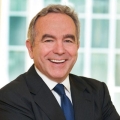Course Correction: Toward an Effective and Sustainable China Policy (Washington, D.C. Report Launch)
VIEW EVENT DETAILSReport Launch and Press Briefing: Task Force on U.S.-China Policy
Two years into the Trump administration, the United States and the People’s Republic of China find their bilateral relationship at a dangerous crossroads. As more stresses and strains beset their relationship, both sides are casting about for redefinitions of their national interest and new policy directions for attaining them.
Comprised of 17 of America's top China experts, the Task Force on U.S.-China Policy is issuing its second set of findings February 12, 2019 in its new report “Course Correction: Toward an Effective and Sustainable China Policy” which addresses the following critical question:
What is the correct balance between seeking common interest and pushing back against China’s increasingly assertive policies in:
• Trade and Economics
• Security
• Global Governance
• Human Rights
• China’s Overseas Influence Activities
8:45 a.m. Registration and Breakfast
9:15 a.m. Program
The report will be published and available here on February 12, 2019.
Read a Q&A with Orville Schell about the report here.
Join us for a discussion of this critical topic with six members of the Task Force.

Orville Schell is the Arthur Ross Director of the Center on U.S.-China Relations at Asia Society. He is a former professor and dean at the University of California, Berkeley Graduate School of Journalism. Schell is the author of 15 books, 10 of them about China, and a contributor to numerous edited volumes as well as magazines, including The New Yorker, The Atlantic, The New York Times, The Nation, and The New York Review of Books. His most recent book is Wealth and Power: China’s Long March to the 21st Century, with John Delury (2013). Schell worked for the Ford Foundation in Indonesia, covered the war in Indochina as a journalist, and has traveled widely in China since the mid-70s. Schell is the recipient of many prizes and fellowships, including a Guggenheim Fellowship, the Overseas Press Club Award, and the Harvard-Stanford Shorenstein Prize in Asian Journalism.

Susan L. Shirk is chair of the 21st Century China Center and research professor at the University of California, San Diego School of Global Policy and Strategy. She previously served as deputy assistant secretary of state from 1997 to 2000, where she was responsible for U.S. policy toward China, Taiwan, Hong Kong, and Mongolia. Shirk founded and continues to lead the Northeast Asia Cooperation Dialogue, an unofficial forum for discussions of security issues. Her book, China: Fragile Superpower (2008), helped frame the debate on China policy in the United States and other countries. Her most recent book, Changing Media, Changing China, was published in 2010 by Oxford University Press.

Charlene Barshefsky is a senior international partner at WilmerHale. She joined the firm after serving as the U.S. Trade Representative from 1997 to 2001, and acting as deputy USTR from 1993 to 1996. As the USTR and a member of the president’s cabinet, she was responsible for the negotiation of hundreds of complex market access, regulatory, and investment agreements with virtually every major country in the world. Barshefsky is best known internationally as the architect and chief negotiator of China’s historic WTO agreement, as well as global agreements in financial services, telecommunications, intellectual property rights, high-technology products, and cyberspace. Her legal career in the field has encompassed international litigation, commercial negotiations, investment and regulatory advice, and dispute resolution, and she has written and lectured extensively both in the United States and abroad.

Kurt M. Campbell is chairman and chief executive officer of The Asia Group, LLC, a strategic advisory and capital management group specializing in the Asia-Pacific region. He also serves as chairman of the board of the Center for a New American Security, as a non-resident fellow at Harvard University’s Belfer Center, and as vice chairman of the East-West Center in Hawaii. He was also appointed as the Henry A. Kissinger Fellow at the McCain Institute for 2018. From 2009 to 2013, Campbell served as the assistant secretary of state for East Asian and Pacific Affairs, where he is widely credited as being a key architect of the “pivot to Asia.” For advancing a comprehensive U.S. strategy, Secretary Hillary Clinton awarded him the Secretary of State’s Distinguished Service Award (2013). He is the author or editor of ten books, most recently The Pivot: The Future of American Statecraft in Asia (2016). Campbell received his doctorate in international relations from Brasenose College at Oxford University, where he was a Marshall Scholar.

Melanie Hart is a senior fellow and director of China policy at Center for American Progress. She focuses on U.S. foreign policy toward China and works to identify new opportunities for bilateral cooperation, particularly on energy, climate change, and cross-border investment. Her research also covers China’s political system, market regulatory reforms, and how China’s domestic and foreign policy developments affect the United States. Before joining CAP, she worked as a project consultant for the Aspen Institute International Digital Economy Accords project. She also worked on Qualcomm’s China business development team, where she provided technology market and regulatory analysis to guide Qualcomm operations in Greater China. Hart has a Ph.D. in political science from the University of California, San Diego.

David Shambaugh is the Gaston Sigur Professor of Asian Studies, Political Science and International Affairs and director of the China Policy Program in the Elliott School of International Affairs at George Washington University. He has been a member of the board of directors of the National Committee on U.S.-China Relations and is a member of the Council on Foreign Relations, International Institute of Strategic Studies, U.S. Asia Pacific Council, and a number of editorial boards and academic review bodies. Shambaugh has published more than thirty books and numerous articles and chapters. His most recent books are The China Reader: Rising Power (2016), China Goes Global: The Partial Power (2013), and China’s Future (2016); the latter two were both selected by The Economist as “Best Books of the Year.” He is currently working on his next book, Where Great Powers Meet: America & China in Southeast Asia (Oxford University Press, 2019). He received his Ph.D. in political science from the University of Michigan.
The Task Force on U.S.-China Policy is a project of Asia Society’s Center on U.S.-China Relations and the University of California San Diego’s 21st Century China Center in partnership with the Annenberg Foundation Trust at Sunnylands.
IN COLLABORATION WITH:

This project was made possible by a grant from the Carnegie Corporation of New York, with additional support from The Annenberg Foundation Trust at Sunnylands, Henry Luce Foundation, and The Janet and Arthur Ross Foundation.
Event Details
National Press Club
Holeman Lounge
529 14th St NW, Washington, DC 20045


